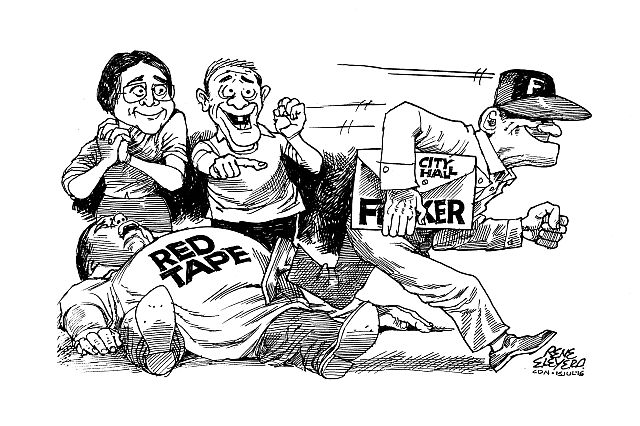
Cebu City Mayor Tomas Osmeña isn’t one to be restrained from experimentation; and one of his recent announcements to create a so-called Department of Fixers at City Hall, while certainly out of the box, suffers anew from an unfortunate choice of terms.
It’s not unlike his vow to engage in “ethnic cleansing” at City Hall which, while actually referring to house cleaning the city government’s bureaucratic rank and file and reassignment to parts unknown of department heads loyal to his former protégé, is used in other parts of the world to mean the liquidation of racial and ethnic minorities that the ruling majority deems unfit and dangerous if left unchecked.
When asked about it in a TV interview, the mayor said he used the term as a “metaphor.” His pronouncement about a Department of Fixers is yet another story, albeit something more detailed and plausible at least if one were to look at it from his perspective.
Mayor Osmeña said since the concept and existence of fixers are already ingrained in the country’s culture, he might as well legitimize it by appointing people to transact with the public in behalf of City Hall.
Based on his setup — he would do away with proposing this to the City Council which is dominated by his critics — there would be a hotline for city residents to use in addressing their complaints, and fixers will be assigned to handle the complaints.
The city residents won’t be allowed to pick their fixers, a regulatory measure perhaps, and the fixers will also handle every complaint regardless of whether or not it falls within their individual specialty or area of responsibility.
Osmeña said he thought about the Department of Fixers to eliminate the bureaucratic red tape prevalent in Cebu City Hall and compared it to the former Cebu Investments Promotion Center (CIPC) which handled every requirement and processing of prospective investors.
While the “one-stop shop” concept had already been practiced by other local governments, the “restaurant” analogy is pretty interesting, if not applicable.
But we digress. That it had to take fixers to handle the transactions of the public is a telling indictment on the dismal quality of service done by every department head and employee at City Hall on a daily basis.
The term may be somewhat wrong, but the concept and rationale as explained by Osmeña have some basis and justification however denigrating it may be to the men and women who work and lead at City Hall.
Apparently, President Rodrigo Duterte’s call for government agencies to streamline their operations and severely cut back on their bureaucratic red tape has a counterpart solution in Osmeña’s Department of Fixers. Either way, both should remind the people in government that their days of procrastinating and ignoring the people they serve are over.